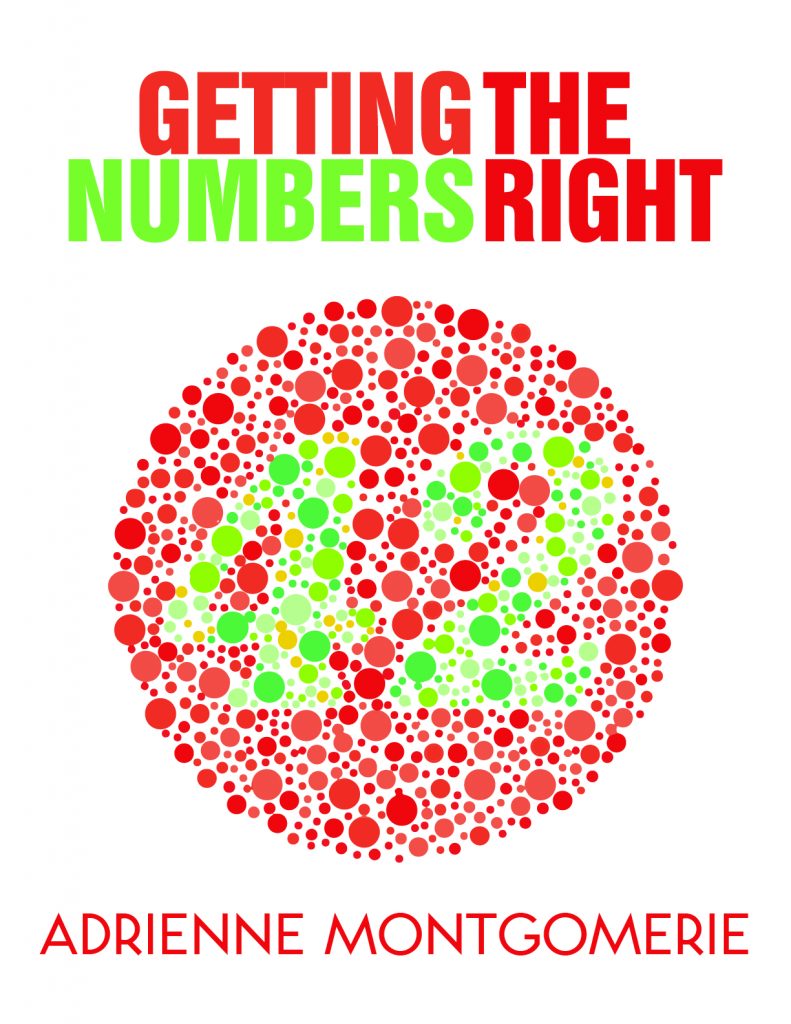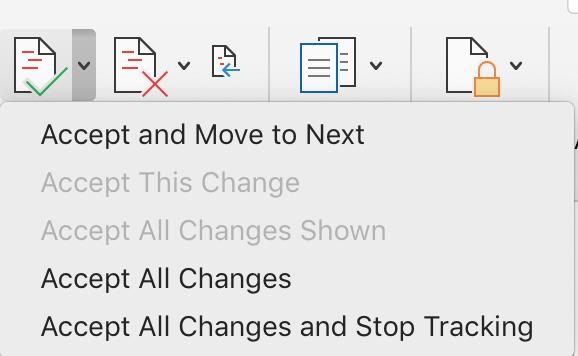QSuddenly Word is showing all changes clumped into a single marginal balloon, not as separate entries. And what’s showing in the balloon is what’s left, not what was deleted!
Continue reading Q&A: Tracked changes balloons are showing only what’s left!Tag Archives: Track Changes
Try This! Track Changes in Word
Track Changes is a feature of Word that lets each person on the team show their suggested revisions and leave comments “attached” to content without becoming part of the content itself (and thus avoiding the disastrous embarassement of comments making it into the final product).
Download this 132 kb file, then try the steps below. Check your work against the answer figure shown at the end.
Continue reading Try This! Track Changes in WordQ&A: How Can I Cross-reference Comments in Word?
QHow can I cross-reference comments in a Word manuscript now that Word doesn’t show comment numbers?
Continue reading Q&A: How Can I Cross-reference Comments in Word?Reject Tracked Changes Cleanly

Every time you replace a word (or words) in MS Word using tracked changes, Word annotates two changes: a deletion and an insertion. To reject a change and reinstate the original, you have to reject BOTH changes.
Two Ways to Reject Tracked Changes
Continue reading Reject Tracked Changes CleanlyGoogle Docs, Meet Word
When editors work in Word, they have access to many customizable tools and advanced features that make their work more consistent and faster:
- Customizable and importable dictionaries
- Plug-ins
- Macros
- Styles
- Wildcards
- And every hack in the book
Import–Export Handshake

The good news is that Google Docs plays well with Word, now. The bad news is that this requires you to (and only works if you do) export the document into a Word file, work on it, and then re-upload it to Google Docs when you are done.
I’ve let a couple of my editing students use it (for reasons) and am thrilled to find that Google Docs now produces great markup of the Tracked Changes and Comments when it makes a Word file. It also maintains my markup and comments from Word when I reupload it to Google Docs!
I still do better, faster editing work by using all my macros, plug-ins, and dozens of other customized tools in Word, so this compatibility is very hopeful news.
Markup Using Google Docs
The Suggesting feature in Google Docs marks up text much like Word does with Track Changes and Comments. The reason you want to use this is not only so that the changes stand out for review and can be easily accepted or rejected and so that comments are easy to find. More importantly, by leaving “suggestions” and tracked changes, you avoid having your comments and other infelicities end up in the final product because someone missed deleting them! This has happened many times and it is always an enormous embarrassment as it’s shared widely across the internet.
In Google Docs, click on the speech bubble icon at the top right of the screen. This opens the small menu shown in the image below. Click the Suggesting option to turn on the tracking mode. Then, type additions and delete text without further concern—they will be tracked. Add comments by clicking the speech bubble icon with the plus—the one just to the left of the pop-down menu in the example below.
Troubleshooting
Do not let the writer keep working on the Google Doc while you are editing in Word. These are now two separate versions of the file—the on in GDocs and yours in Word—and their changes will not be incorporated into your edits. You’ll be uploading a new version, separately, since you can’t upload–convert into an existing Google Doc. Ideally, you will lock the old Google Doc from further changes.
At minimum, add in a very large, colourful font at the top of the original Google Doc reading: DEAD FILE. Changing the colour and font family of the body content would also give visual signals that it is not the file to work on. Also change the doc’s name to include the words dead file.
While you might be frustrated by the seemingly endless updates (changes) to Microsoft products, Google Docs updates even more often. So what I say here may be out of date by the time you read it. So far, Google Docs keeps getting better and more functional. So let’s hope that’s what you find.
Styles and internal cross-references do not get carried over elegantly from Word to Google Docs. Just be aware of this, and plan on fixing the flubs in production/layout.
Erin Brenner of Right Touch Editing recently described her method of editing in Google Docs and limiting the pitfalls of working in a live document within GDocs, separate from Word. Check out her advice.

Got a gnarly Word problem? Submit your problem and we’ll try to answer it in the Q&A thread.




Learn with us! Join a course today.
© This blog and all materials in it are copyright Adrienne Montgomerie on the date of publication. All rights reserved. No portion may be stored or distributed without express written permission. Asking is easy!
Delivery image modified from original base image by mohamed Hassan on Pixabay.
Q&A: Can I accept only formatting changes?
Q Is there a way to only accept all formatting changes without accepting moved text? I can’t make it show *only* formatting. I can hide insertions/deletions and “accept all shown,” but that would also accept moves?
A You got it! Just hide all changes except the formatting ones and “Accept All Changes Shown” as shown in the steps below:
Continue reading Q&A: Can I accept only formatting changes?Q&A: Keyboard Shortcut to Exit a Comment
Q Is there a way to get out of a Comment without using the mouse?
Esc, ←

A Yes, press Escape! Keeping your hands on the keyboard is the fastest way to work, and the perfect alternative to a mouse that’s lost its juice.
Troubleshooting
Continue reading Q&A: Keyboard Shortcut to Exit a CommentHorizontal Review Pane for Mac
Call it a glitch, but if you’re missing the horizontal Reviewing Pane option in MS Word on your Mac, you can turn this glitch into a happy hack!
Create a macro for adding a comment and assign a shortcut to it. That’s it. You don’t have to add anything else to the macro. Using the macro will automatically open each new comment in a Reviewing Pane along the bottom of the screen (see figure).
Continue reading Horizontal Review Pane for MacStreamline Accepting Changes
Click less when resolving tracked changes with this pro tip!

Reject changes you do not like, and leave the rest. That leaves a
document full of changes that you do want to accept. Then, select Accept All Changes from the Review ribbon and clean up the file with a single click!
Spot What Tracked Changes Can Hide

Always give a document a once-over in Simple Markup or No Markup view before submitting it as a finished edit. This often reveals a bunch of formatting errors that arise from working with markup displayed (that is, with Track Changes visible). Common errors often obscured by the redlining on the screen include:
- double spaces between words,
- spaces around punctuation, or
- no spaces between words.



